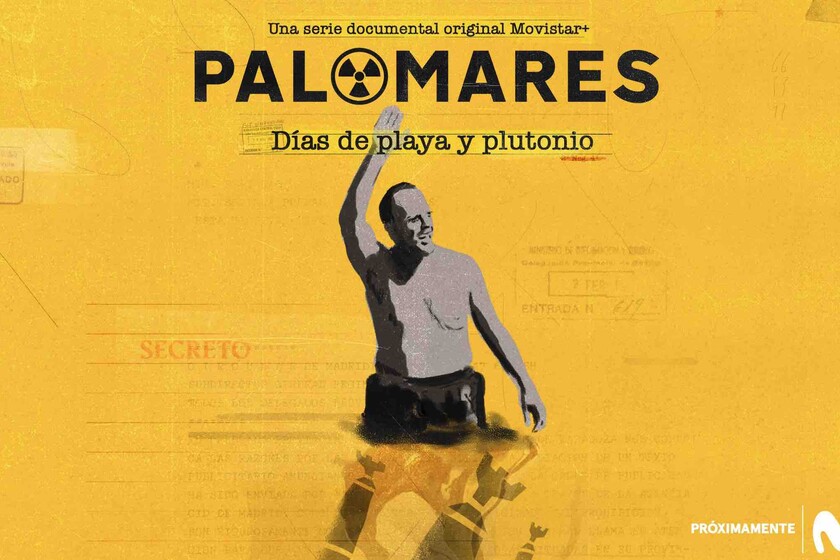Movistar + he scored a great goal more than a year ago with ‘El Palmar de Troya’, a wonderful docuserie that tackled the unusual case of a Spanish sect. Now the company has once again collaborated with the production company ’93 Metros’ in ‘Palomares: Días de playa y plutonio’, a four-episode documentary series released this April 22 that explores the historical nuclear accident that took place in our country 55 years ago.
An event that many of us inexorably associate with the bathroom that Manuel Fraga, at that time Minister of Information and Tourism of the Franco dictatorship, came to the beach of Quitapellejos in the town of Palomares to try to calm the fears of the population due to the radioactive material that had spread through the area as a result of the collision between two aircraft from the United States. An unforgettable image, but ‘Palomares: Beach and Plutonium Days’ goes way beyond that.
Knows how to arouse curiosity
All documentaries are marked by the presence of those responsible, who more or less decisively make a decision on how to approach the real story they are telling. There is nothing wrong with that except when it leads the work in question to the biased, forcing the viewer to decide to what extent he assumes what he sees on the screen. Obviously, ‘Palomares: Days of beach and plutonium’ is not without a positioning, but the efforts to portray what happened with the greatest equanimity possible are noticeable.
That is something that Alvaro Ron, director of the series, has been in charge of highlighting during the promotional campaign of the docuseries, noting that “My work has consisted of listening to them, giving them a voice and letting them and their story build the story, they have marked the script, the rest has been editing”, But ‘Palomares: Days of beach and plutonium’ is more than a succession of statements, since, as I pointed out before, this work carried out by Ron has led to a work with a certain thriller nature.

That leads us to a more playful proposition than one might expect before the dramatic nature of the real event that it addresses. It is not that it turns towards the comic -although there is some slight hint here and there that is appreciated-, but it does worry about putting together a story in such a way as to justify the fact of having opted for a docuseries instead of for a documentary feature film.
Engage while being meticulous

We have a good example of this with the way to end the second episode, which will not be able to be seen on Movistar + until next week, but before that those responsible had known how to balance the needs very well between portraying everything that happened in the greatest possible depth. , alternating the available material of the time with a multitude of interviews with several of those present when the nuclear accident took place and even reconstructions of different moments to give a greater dramatic packaging to the series, with the obligation to hook the viewer With a story that he could already know in advance as soon as he had bothered to delve a little into what happened in Palomares as of January 17, 1966.
In this way, ‘Palomares: Beach and Plutonium Days’ knows how to capture the seriousness of what happened, with the authorities’ attempts to cover it up, throwing it away and hosting it between the governments of the United States and Spain to see how to try to find one. solution and a multitude of situations that one wants to think that could never take place today. To a certain extent that was the least that could be asked of him, since the force of the story would be diluted with a lazy approach and here in everything I have seen you can see the care and meticulousness to try to be the definitive document in this regard, also counting on many more means than usual in the parties to reconstruct certain situations.

What others might have neglected is the need to an agile assembly to add dynamism, but also the result of a well-detailed plan of what you want to convey to the viewer. It is true that the introduction may be a little longer due to the need to present too many stakeholders, but once it takes off it is very difficult to stop seeing what it proposes, while using the maximum possible rigor and certain tricks to hook the viewer, a mixture that in other cases could have sunk the credibility of ‘Palomares: Days of the beach and plutonium’.
In short

It is true that I enjoyed more with ‘El Palmar de Troya’, probably because there were a number of elements there to provoke the astonishment and disbelief of the spectator that ‘Palomares: Days of the beach and plutonium’ is impossible to achieve. At the end of the day, both are unusual events, but the nuclear accident is more or less ruled by a government cover-up more or less expected at the time, while the case of the Palmarians continues to be one of those that is hard to believe that it happened. All in all, I have been very satisfied with this new Movistar + docuseries and I hope they continue to do more with this level.
